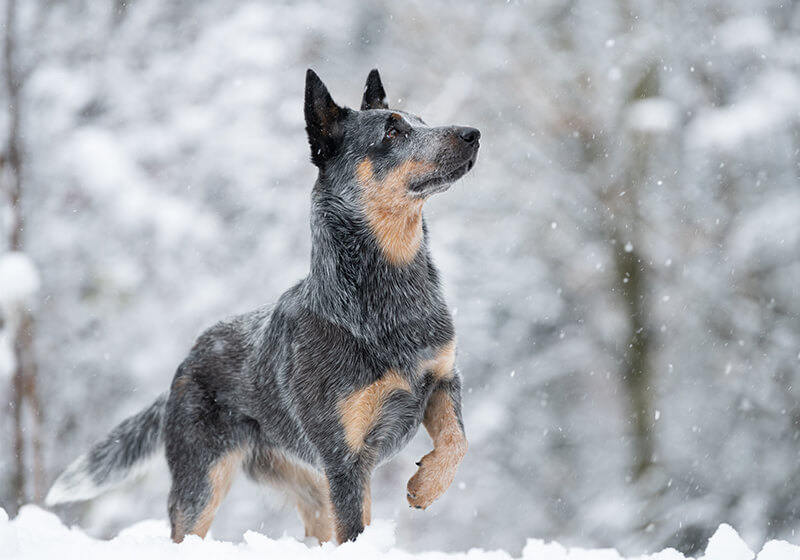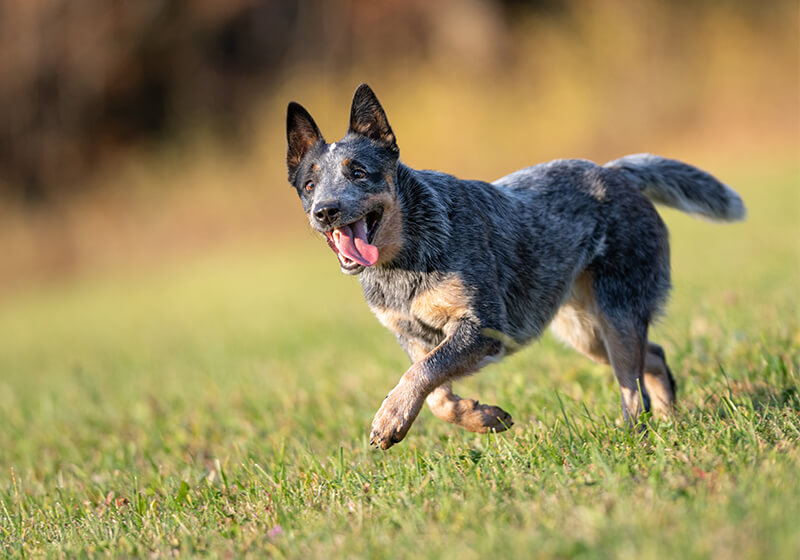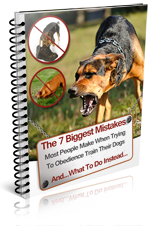
The Australian Cattle Dog is a serious working dog, bred to herd dangerous livestock without the benefit of human instruction. A cross between the Scottish Highland Collie, the Dalmatian, Kelpie, Bull Terrier and wild Dingo, the ACD is a intelligent dog used to acting first and asking questions later. The breed is not an ideal choice for the novice owner: these dogs were never intended to be simply household pets, and raising one is a time-consuming and sometimes difficult task. You must be fully aware of the commitment of owning a Cattle Dog before purchasing one.
Breed Characteristics
- These are smart dogs with a low boredom tolerance. They require lots of mental and physical stimulation. ACDs do not do well if shut up in the yard or left alone for more than a few hours, especially on a regular basis; if you work full-time, or have a demanding schedule, your house and possessions (not to mention the dog) will suffer for it.
- The Cattle Dog is bred to work long, hard hours every day. Without one to three hours of vigorous activity on a daily basis, he will quickly turn to more destructive outlets for his energy such as chewing through your walls, destroying furniture, or landscaping your garden into a collection of craters and soil piles. This is a real working breed, not intended to be merely a household pet: the dogs need interesting ways to vent excess energy at all times.
- Because of their herding heritage, ACDs are hardwired to chase and nip at anything that moves: joggers, cars, passersby, cats, etc. This is one reason why they are not recommended as family pets for any household with small children.
- Your garden will need to be fully enclosed with a high fence and wire sunk into the ground to discourage digging. ADCs are accomplished escape artists fully capable of leaping five feet with ease; fences must be at least six feet tall. Choosing a solid fence, instead of chain-link, can prevent a lot of irritating barking: if he can't see people and other dogs walking past, he's won't need to announce their presence.
- Effective watch-dogs, ACDs are naturally suspicious of newcomers and strangers. They require extensive socialization from an early age to prevent this attitude becoming a problem and to teach them to discriminate accurately between friend and foe.
- Cattle Dogs are often aggressive towards other animals, particularly dogs of the same sex. You'll need to be vigilant when he's off-leash.
- The intense, high-pitched bark of some ACDs can drive many people up the wall. Excessive barking is one of the less desirable traits of the breed, and, though not all ACDs will give voice for no apparent reason, if left alone most will do so repetitively. If your dog is likely to be alone and unsupervised for more than a few hours a day, and if you have neighbors within earshot, this breed is not recommended.
- These dogs have headstrong natures and will challenge you for the alpha position as they reach adolescence. They require a confident, strong-minded owner capable of consistently proving that they are the boss. ACDs can be manipulative and will try to make you prove that you can influence their behavior; to hold your own, you'll need to be clued-up on dog psychology, communication, and the concept of alpha-status.
How to Raise a Well-Behaved Australian Cattle Dog
Raising a Cattle Dog is a demanding task: your ACD's respect has to be actively earned and maintained. Adolescence will likely be a challenging time, and you'll need to be alert for any signs of attempted dominance.
- Puppy training school is an absolute necessity. To counteract his naturally suspicious nature, your Cattle Dog must be introduced to a wide variety of people and dogs as soon as he's had his shots. If you don't socialize your dog thoroughly from a very young age, he will most likely be unsafe off the lead when he hits adolescence.
- A dominant-minded breed, the Australian Cattle Dog is not a good dog for a first-time owner, as he is quick to sense uncertainty and is generally quite happy to turn the situation to his advantage. The difficulty in training him is due to his extensive capacity for independent thought: he likes to challenge authority, and at times he can be manipulative and may take advantage of the soft-hearted owner. These dogs don't particularly care about pleasing you; they have a typical "what's in it for me?" mindset. You must be capable of consistently keeping him in line, and will need to gain and keep his respect from an early age.
- Exercise him vigorously and consistently. If you don't want to take your ACD hiking, running, swimming, or out on bike rides, consider involving him in agility (obstacle courses). These are effective as a vent for excess energy, as they're quite physically demanding; but also encourage the development of an intense bond between owner and dog, due to the high requirement of communication between you both.
- In order to prevent excess aggression towards other animals, consider neutering your male ACD. This will remove the 'aggression hormones' from his system, and will also prevent other dogs treating him like a threat (he no longer smells like a male). This simple operation helps to avoid a lot of trouble!
- You'll need to spend time training your Queensland Heeler every day. If you spend about half an hour a day training during puppyhood and adolescence (brokend up into bite-sized chunks), and then reduce this down to fifteen minutes a day during adulthood, this will ensure that he remains obedient to you, and that he's reminded of your alpha status on a daily basis. ACDs are a relatively high-maintenance breed, and if you care at all about your dog's behavior as an adult, you will need to put in some hard work as he grows up.
- When training, it will help if you arm yourself with a cheery manner and some tempting food-treats. You must make him work for these; don't dole them out too readily!
Can You Handle an Australian Cattle Dog?
Despite the many challenges of owning a Heeler, they are extremely rewarding dogs to share your life with: loyal, intelligent, and with a huge capacity for affection. Providing that you are prepared to put in the work required: remember, these are not Golden Retrievers - your Cattle Dog will not be a pushover to train! - the result will be a charming, intelligent, and attractive adult dog.


